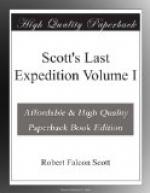This ice looks as though it must have come from the Ross Sea, and yet one is puzzled to account for the absence of pressure.
We have lain tight in the pack all day; the wind from 6 A.M. strong from W. and N.W., with snow; the wind has eased to-night, and for some hours the glass, which fell rapidly last night, has been stationary. I expect the wind will shift soon; pressure on the pack has eased, but so far it has not opened.
This morning Rennick got a sounding at 2015 fathoms from bottom similar to yesterday, with small pieces of basic lava; these two soundings appear to show a great distribution of this volcanic rock by ice. The line was weighed by hand after the soundings. I read Service in the wardroom.
This afternoon all hands have been away on ski over the floes. It is delightful to get the exercise. I’m much pleased with the ski and ski boots—both are very well adapted to our purposes.
This waiting requires patience, though I suppose it was to be expected at such an early season. It is difficult to know when to try and push on again.
Monday, December 12.—The pack was a little looser this morning; there was a distinct long swell apparently from N.W. The floes were not apart but barely touching the edges, which were hard pressed yesterday; the wind still holds from N.W., but lighter. Gran, Oates, and Bowers went on ski towards a reported island about which there had been some difference of opinion. I felt certain it was a berg, and it proved to be so; only of a very curious dome shape with very low cliffs all about.
Fires were ordered for 12, and at 11.30 we started steaming with plain sail set. We made, and are making fair progress on the whole, but it is very uneven. We escaped from the heavy floes about us into much thinner pack, then through two water holes, then back to the thinner pack consisting of thin floes of large area fairly easily broken. All went well till we struck heavy floes again, then for half an hour we stopped dead. Then on again, and since alternately bad and good—that is, thin young floes and hoary older ones, occasionally a pressed up berg, very heavy.
The best news of yesterday was that we drifted 15 miles to the S.E., so that we have not really stopped our progress at all, though it has, of course, been pretty slow.
I really don’t know what to think of the pack, or when to hope for open water.
We tried Atkinson’s blubber stove this afternoon with great success. The interior of the stove holds a pipe in a single coil pierced with holes on the under side. These holes drip oil on to an asbestos burner. The blubber is placed in a tank suitably built around the chimney; the overflow of oil from this tank leads to the feed pipe in the stove, with a cock to regulate the flow. A very simple device, but as has been shown a very effective one; the stove gives great heat, but, of course, some blubber smell. However, with such stoves in the south one would never lack cooked food or warm hut.




